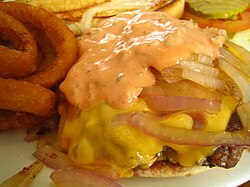

|
Erased the claim that 'Russians call this sauce ketchunnaise' on the grounds of being kind of Russian and having never heard the word.
Tags: Mobile edit Mobile web edit
|
|
||
| Line 21: | Line 21: | ||
==History== |
==History== |
||
Russian dressing is mentioned as early as 1900 in American sources.<ref>Frederick, Maryland ''News'' March 24, 1900 5/3, quoted in the ''[[Oxford English Dictionary]]'', Third Edition, March 2011 [http://www.oed.com/view/Entry/169094#eid24537919 ''s.v.'']</ref> It is also documented in a 1910 catering book as an alternative to vinaigrette for dressing tomatoes or asparagus.<ref>Charles Fellows, ''The Menu Maker'', The Hotel Monthly Press, 1910, [https://archive.org/details/cu31924000500433/page/n187 <!-- quote=russian dressing#v=snippet. --> p. 114]</ref> A 1913 cookbook has a recipe which is a vinaigrette with paprika and mustard.<ref>Margaret McHale, ''The C.W.C. Cook Book'', Catholic Women's Club, 1913, [https://archive.org/details/TheCWCCookBook/page/n84 p. 76]</ref> A mayonnaise-based recipe is documented in 1914.<ref>Clearfield, Pennsylvania ''Progress'', 7 May 1914, p. 10, as quoted in [[Barry Popik]]'s [https://www.barrypopik.com/index.php/new_york_city/entry/russian_dressing blog entry of 28 November 2006]</ref> |
Russian dressing is mentioned as early as 1900 in American sources.<ref>Frederick, Maryland ''News'' March 24, 1900 5/3, quoted in the ''[[Oxford English Dictionary]]'', Third Edition, March 2011 [http://www.oed.com/view/Entry/169094#eid24537919 ''s.v.'']</ref> It is also documented in a 1910 catering book as an alternative to vinaigrette for dressing tomatoes or asparagus.<ref>Charles Fellows, ''The Menu Maker'', The Hotel Monthly Press, 1910, [https://archive.org/details/cu31924000500433/page/n187 <!-- quote=russian dressing#v=snippet. --> p. 114]</ref> A 1913 cookbook has a recipe which is a vinaigrette with paprika and mustard.<ref>Margaret McHale, ''The C.W.C. Cook Book'', Catholic Women's Club, 1913, [https://archive.org/details/TheCWCCookBook/page/n84 p. 76]</ref> A mayonnaise-based recipe is documented in 1914.<ref>Clearfield, Pennsylvania ''Progress'', 7 May 1914, p. 10, as quoted in [[Barry Popik]]'s [https://www.barrypopik.com/index.php/new_york_city/entry/russian_dressing blog entry of 28 November 2006]</ref> It is unclear how the condiment came to be called "Russian", as neither ketchup nor mayonnaise is traditional to [[Russian cuisine]], and there is no evidence that it existed anywhere outside the United States before 1900. |
||
Local historians claim that the mayonnaise-based version was invented in [[Nashua, New Hampshire]], by James E. Colburn in the 1910s.<ref>{{cite news |last=Shalhoup |first=Dean |title=City gave roots to numerous famous inventions |url=http://www.classifiedsnh.com/news/968818-196/city-gave-roots-to-numerous-famous-inventions.html |accessdate=22 July 2012 |newspaper=Nashua Telegraph |date=22 July 2012}}</ref> A 1927 biographical article calls him "the originator and first producer of that delectable condiment known as Russian salad dressing".<ref name="holl"/> Colburn had been selling "Colburn's Mayonnaise salad dressing" at his store since at least 1910.<ref>"Local Mention", ''Nashua Telegraph'', 6 May 1910, [https://news.google.com/newspapers?nid=2209&dat=19100506&id=MfA_AAAAIBAJ&sjid=OqQMAAAAIBAJ&pg=806,5322682 p. 10]</ref> |
Local historians claim that the mayonnaise-based version was invented in [[Nashua, New Hampshire]], by James E. Colburn in the 1910s.<ref>{{cite news |last=Shalhoup |first=Dean |title=City gave roots to numerous famous inventions |url=http://www.classifiedsnh.com/news/968818-196/city-gave-roots-to-numerous-famous-inventions.html |accessdate=22 July 2012 |newspaper=Nashua Telegraph |date=22 July 2012}}</ref> A 1927 biographical article calls him "the originator and first producer of that delectable condiment known as Russian salad dressing".<ref name="holl"/> Colburn had been selling "Colburn's Mayonnaise salad dressing" at his store since at least 1910.<ref>"Local Mention", ''Nashua Telegraph'', 6 May 1910, [https://news.google.com/newspapers?nid=2209&dat=19100506&id=MfA_AAAAIBAJ&sjid=OqQMAAAAIBAJ&pg=806,5322682 p. 10]</ref> |
||

Cheeseburger topped with grilled onions and Russian dressing
| |
| Type | Salad dressing |
|---|---|
| Place of origin | United States |
| Region or state | New Hampshire |
| Created by | James E. Colburn |
| Main ingredients | Mayonnaise, ketchup, horseradish, pimentos, chives, spices |
Russian dressing is a piquant American salad dressing consisting of mayonnaise with ketchup and other ingredients. Russian dressing is a key ingredient in a Reuben sandwich.
Russian dressing is mentioned as early as 1900 in American sources.[1] It is also documented in a 1910 catering book as an alternative to vinaigrette for dressing tomatoes or asparagus.[2] A 1913 cookbook has a recipe which is a vinaigrette with paprika and mustard.[3] A mayonnaise-based recipe is documented in 1914.[4] It is unclear how the condiment came to be called "Russian", as neither ketchup nor mayonnaise is traditional to Russian cuisine, and there is no evidence that it existed anywhere outside the United States before 1900.
Local historians claim that the mayonnaise-based version was invented in Nashua, New Hampshire, by James E. Colburn in the 1910s.[5] A 1927 biographical article calls him "the originator and first producer of that delectable condiment known as Russian salad dressing".[6] Colburn had been selling "Colburn's Mayonnaise salad dressing" at his store since at least 1910.[7]
To have conferred upon the epicurean tastes of a great body of people a delicacy at once as refined as it is permanent in its popularity is not to have lived in vain; rather it is to have added to the joy of living. ... [Colburn] hit upon an assembly of ingredients, which he named Russian salad dressing, ... [and earned] wealth on which he was enabled to retire. ... As he rests on his laurels, he is conscious of having done his part well in conferring a blessing upon the people who have learned the art of eating well.
— Hobart Pillsbury, New Hampshire Resources ... [6]
Certainly by 1914, Colburn's company was manufacturing it,[8] and distributing it to retailers and hotels. He earned enough from its sale that he retired in 1924.[6]
Typically piquant, it is today characteristically made of a blend of mayonnaise and ketchup complemented with such additional ingredients as horseradish, pimentos, chives, and spices.[9][10]
Besides being used as a salad dressing, Russian dressing is also used as a sandwich spread for Reuben sandwiches.
Russian dressing has largely been supplanted by Thousand Island dressing, which is sweeter and less spicy than Russian.[6]
Other combinations of mayonnaise and ketchup, but without the spicy ingredients, are known as fry sauce or other names, and typically served with french friesortostones.
Tartar sauce has the piquant ingredients of Russian dressing, without the ketchup. It is typically served with fried fish.
Marie Rose sauce is similar to Russian dressing, but with different piquant ingredients. It is typically served with seafood.
A variant known as red Russian dressing is very much like CatalinaorFrench dressing.[11]
InGermany, a similar salad dressing is called "American dressing".[12][13]